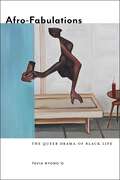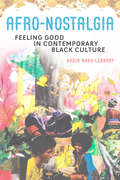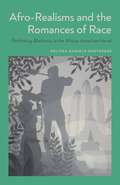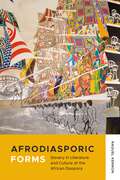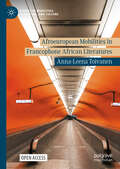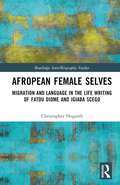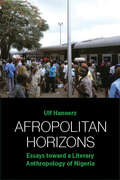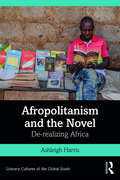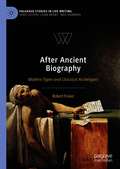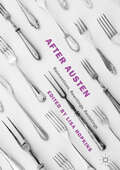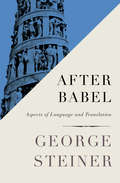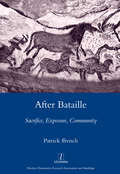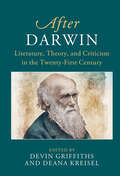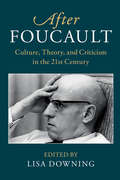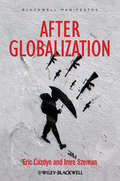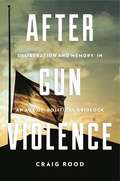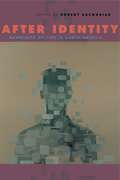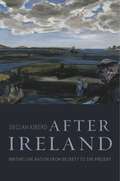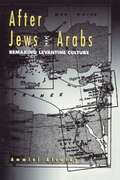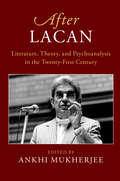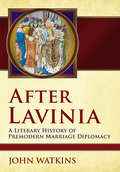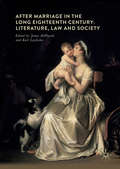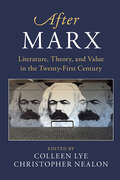- Table View
- List View
Afro-Fabulations: The Queer Drama of Black Life (Sexual Cultures #14)
by Tavia Nyong'oWinner, 2019 Barnard Hewitt Award for Outstanding Research in Theatre History, given by the American Society for Theatre ResearchHonorable Mention, 2021 Errol Hill Award, given by the American Society for Theatre ResearchArgues for a conception of black cultural life that exceeds post-blackness and conditions of loss In Afro-Fabulations: The Queer Drama of Black Life, cultural critic and historian Tavia Nyong’o surveys the conditions of contemporary black artistic production in the era of post-blackness. Moving fluidly between the insurgent art of the 1960’s and the intersectional activism of the present day, Afro-Fabulations challenges genealogies of blackness that ignore its creative capacity to exceed conditions of traumatic loss, social death, and archival erasure.If black survival in an anti-black world often feels like a race against time, Afro-Fabulations looks to the modes of memory and imagination through which a queer and black polytemporality is invented and sustained. Moving past the antirelational debates in queer theory, Nyong’o posits queerness as “angular sociality,” drawing upon queer of color critique in order to name the gate and rhythm of black social life as it moves in and out of step with itself. He takes up a broad range of sites of analysis, from speculative fiction to performance art, from artificial intelligence to Blaxploitation cinema. Reading the archive of violence and trauma against the grain, Afro-Fabulations summons the poetic powers of queer world-making that have always been immanent to the fight and play of black life.
Afro-Nostalgia: Feeling Good in Contemporary Black Culture (New Black Studies Series #1)
by Badia Ahad-LegardyThe past as a building block of a more affirming and hopeful future As early as the eighteenth century, white Americans and Europeans believed that people of African descent could not experience nostalgia. As a result, black lives have been predominately narrated through historical scenes of slavery and oppression. This phenomenon created a missing archive of romantic historical memories. Badia Ahad-Legardy mines literature, visual culture, performance, and culinary arts to form an archive of black historical joy for use by the African-descended. Her analysis reveals how contemporary black artists find more than trauma and subjugation within the historical past. Drawing on contemporary African American culture and recent psychological studies, Ahad-Legardy reveals nostalgia’s capacity to produce positive emotions. Afro-nostalgia emerges as an expression of black romantic recollection that creates and inspires good feelings even within our darkest moments. Original and provocative, Afro-Nostalgia offers black historical pleasure as a remedy to contend with the disillusionment of the present and the traumas of the past.
Afro-Realisms and the Romances of Race: Rethinking Blackness in the African American Novel
by Melissa Daniels-RauterkusFrom the 1880s to the early 1900s, a particularly turbulent period of U.S. race relations, the African American novel provided a powerful counternarrative to dominant and pejorative ideas about blackness. In Afro-Realisms and the Romances of Race, Melissa Daniels-Rauterkus uncovers how black and white writers experimented with innovative narrative strategies to revise static and stereotypical views of black identity and experience. In this provocative and challenging book, Daniels-Rauterkus contests the long-standing idea that African Americans did not write literary realism, along with the inverse misconception that white writers did not make important contributions to African American literature. Taking up key works by Charles W. Chesnutt, Frances E. W. Harper, Pauline Hopkins, William Dean Howells, and Mark Twain, Daniels-Rauterkus argues that authors blended realism with romance, often merging mimetic and melodramatic conventions to advocate on behalf of African Americans, challenge popular theories of racial identity, disrupt the expectations of the literary marketplace, and widen the possibilities for black representation in fiction. Combining literary history with close textual analysis, Daniels-Rauterkus reads black and white writers alongside each other to demonstrate the reciprocal nature of literary production. Moving beyond discourses of racial authenticity and cultural property, Daniels-Rauterkus stresses the need to organize African American literature around black writers and their meditations on blackness, but she also proposes leaving space for nonblack writers whose use of comparable narrative strategies can facilitate reconsiderations of the complex social order that constitutes race in America. With Afro-Realisms and the Romances of Race, Daniels-Rauterkus expands critical understandings of American literary realism and African American literature by destabilizing the rigid binaries that too often define discussions of race, genre, and periodization.
Afrodiasporic Forms: Slavery in Literature and Culture of the African Diaspora
by Raquel KennonAfrodiasporic Forms explores the epistemological possibilities of the “Black world” paradigm and traces a literary and cultural cartography of the monde noir and its constitutive African diasporas across multiple poetic, visual, and cultural permutations. Examining the transatlantic slave trade and modern racial slavery, Raquel Kennon challenges the US-centric focus of slavery studies and draws on a transnational, eclectic archive of materials from Lusophone, Hispanophone, and Anglophone sources in the Americas to inspect evolving, multitudinous, and disparate forms of Afrodiasporic cultural expression.Spanning the 1830s to the twenty-first century, Afrodiasporic Forms traverses national, linguistic, and disciplinary boundaries as it investigates how cultural products of slavery’s afterlife—including poetry, prose, painting, television, sculpture, and song—shape understandings of the African diaspora. Each chapter uncovers multidirectional pathways for exploring representations of slavery, considering works such as a Brazilian telenovela based on Bernardo Guimarães’s novel A Escrava Isaura, Robert Hayden’s poem “Middle Passage,” Kara Walker’s sculpture A Subtlety, and Juan Francisco Manzano’s Autobiografía de un esclavo. Kennon’s expansive method of comparative reading across the diaspora uses eclectic pairings of canonical and popular textual and artistic sources to stretch beyond disciplinary and national borders, promoting expansive diasporic literacies.
Afroeuropean Mobilities in Francophone African Literatures (Studies in Mobilities, Literature, and Culture)
by Anna-Leena ToivanenThis open access book contributes to the mobility humanities from the perspective of postcolonial literary mobilities and aims at enhancing dialogue between mobilities research and postcolonial literary studies. The study produces new perspectives on Afroeuropean mobilities in Francophone African and Afrodiasporic literatures from the mid-twentieth century to the present, covering a wide set of texts across literary genres. Focusing on representations of educational travel, tourism, diasporic returns, work-related mobilities, and clandestine migratory journeys, Toivanen examines portrayals of mobility practices and modes of transport to map out the meanings of embodied (im)mobilities in the Afroeuropean context. In addition to thematic analysis, the volume also explores the manifestations of mobility in literary form.
Afropean Female Selves: Migration and Language in the Life Writing of Fatou Diome and Igiaba Scego (Routledge Auto/Biography Studies)
by Christopher HogarthAfropean Female Selves: Migration and Language in the Life Writing of Fatou Diome and Igiaba Scego examines the corpus of writing of two contemporary female authors. Both writers are of African descent, live in Europe and write about lives across Europe and Africa in different languages (French and Italian). Their work involves episodes from their lived experience and complicates Western understandings of life writing and autobiography. As Hogarth shows in this study, the works of Diome and Scego encapsulate the new and complex identities of contemporary "Afropeans." As an identity coined and used frequently by prominent authors and critics across Europe, Africa and North America, the notion of "Afropean" is at the cutting edge of cultural analyses today. Yet each writer occupies unique and different positions within this debated category. While Scego is a "post-migratory subject" in postcolonial Europe, Diome is an African writer who has migrated to Europe in her adult life. This book examines the different trajectories and packaging of these two specific postcolonial writers in the Francophone and Italophone contexts, pointing out how and where each author practices life writing strategies and scrutinizing the trend that emphasizes the life writing, autofictional, or autoethnographic strategies of African diasporic writers. Afropean Female Selves offers a comparative study across two languages of a notion that has so far been explored mainly in English. It explores the contours of this new discursive category and positions it in regard to other notions of Afrodiasporic identity, such as Afropolitan and Afro-European.
Afropolitan Horizons: Essays toward a Literary Anthropology of Nigeria
by Ulf HannerzNigeria is a country shaped by internal diversity and transnational connections, past and present. Leading Nigerian writers from Chinua Achebe, Amos Tutuola and Wole Soyinka to Chimamanda Ngozi Adichie and Teju Cole have portrayed these Nigerian issues, and have also written about some of the momentous events in Nigerian history. Afropolitan Horizons discusses their work alongside other novelists and commentators, as well as describing the ways in which Nigeria has appeared in foreign news reporting. It is all interwoven with the author’s own anthropological field research in a town in Central Nigeria.
Afropolitanism and the Novel: De-realizing Africa
by Ashleigh HarrisThe place of the novel as a literary form in Africa is contested. Its colonial origins and its unaffordability for most Africans make it a bad fit for the continent, yet it was also central to the creation of most postcolonial African national literary canons. These bipolar traditions remain unresolved in recent debates about Afropolitanism and the novel in Africa today. This book extends this debate, arguing that Africa’s ‘de-realization’ in global representation and the global economy is reflected in the African novel becoming dominated by Afropolitan, rather than African, aesthetics, styles, and forms. Drawing on close readings of a variety of major African novels of the 2000s, the volume traces the tensions between the novel’s complicity with and resistance to such de-realization. The book argues that current trends and experiments in African non-realist genres, such as science fiction, magical and animist realism, Afro-futurism, and speculative environmentalism, are the result of a preoccupation with such de-realization. The volume is a significant exploration into literary form and its social, philosophical, political, and economic underpinnings. It will be a must-read for scholars, students, and researchers of African literature, politics, philosophy, and culture studies.
After Ancient Biography: Modern Types and Classical Archetypes (Palgrave Studies in Life Writing)
by Robert FraserMarrying life-writing with classical reception, this book examines ancient biography and its impact on subsequent ages. Close readings of ancient texts are framed by an assessment of their influence on the age of the French Revolution and Napoleon, and on the nineteenth, twentieth, and twenty-first centuries, of responses to ancient biography of modern critics, and of its visible legacy in art and film. Crucially it asks what modern biographers can learn from their ancient predecessors. Are the challenges involved in life-writing still the same? Have working methods changed, and in what ways? What in the context of biographical writing is truth, and how are its interests best served? How is it possible, now as then, honestly to convey a life?
After Augustine
by Brian StockAugustine of Hippo was the most prolific and influential writer on reading between antiquity and the Renaissance, though he left no systematic treatise on the subject. His reluctance to synthesize his views on other important themes such as the sacraments suggests that he would have been skeptical of any attempt to bring his statements on reading into a formal theory. Yet Augustine has remained the point of reference to which all later writers invariably return in their search for the roots of problems concerning reading and interpretation in the West. Using Augustine as the touchstone, Brian Stock considers the evolution of the meditative reader within Western reading practices from classical times to the Renaissance. He looks to the problem of self-knowledge in the reading culture of late antiquity; engages the related question of ethical values and literary experience in the same period; and reconsiders Erich Auerbach's interpretation of ancient literary realism. In subsequent chapters, Stock moves forward to the Middle Ages to explore the attitude of medieval Latin authors toward the genre of autobiography as a model for self-representation and takes up the problem of reading, writing, and the self in Petrarch. He compares the role of the reader in Augustine'sCity of Godand Thomas More'sUtopia, and, in a final important move, reframes the problem of European cultural identity by shifting attention from the continuity and change in spoken language to significant shifts in the practice of spiritual, silent reading in the Middle Ages and Renaissance. A richly rewarding reflection on the history and nature of reading,After Augustinepromises to be a centerpiece of discussions about the discovery of the self through literature.
After Austen: Reinventions, Rewritings, Revisitings
by Lisa HopkinsThis collection of twelve new essays examines some of what Jane Austen has become in the two hundred years since her death. Some of the chapters explore adaptations or repurposings of her work while others trace her influence on a surprising variety of different kinds of writing, sometimes even when there is no announced or obvious debt to her. In so doing they also inevitably shed light on Austen herself. Austen is often considered romantic and not often considered political, but both those perceptions are challenged her, as is the idea that she is primarily a writer for and about women. Her books are comic and ironic, but they have been reworked and drawn upon in very different genres and styles. Collectively these essays testify to the extraordinary versatility and resonance of Austen’s books.
After Babel: Aspects of Language and Translation
by George Steiner&“A brilliant work . . . A dazzling meditation on the very nature of language itself&” from the world-renowned scholar and author of The Poetry of Thought (Kirkus Reviews). In his classic work, literary critic and scholar George Steiner tackles what he considers the Babel &“problem&”: Why, over the course of history, have humans developed thousands of different languages when the social, material, and economic advantages of a single tongue are obvious? Steiner argues that different cultures&’ desires for privacy and exclusivity led to each developing its own language. Translation, he believes, is at the very heart of human communication, and thus at the heart of human nature. From our everyday perception of the world around us, to creativity and the uninhibited imagination, to the often inexplicable poignancy of poetry, we are constantly translating—even from our native language.
After Bataille: Sacrifice, Exposure, Community
by Patrick FfrenchAuthor of the obscene narrative Story of the Eye and of works of heretical philosophy such as Inner Experience, Georges Bataille (1897-1962) is one of the most powerful and secretly influential French thinkers of the last century. His work is driven by a compulsion to communicate an experience which exceeds the limits of communicative exchange, and also constitutes a sustained focus on the nature of this complusion. After Bataille takes this sense of compulsion as its motive and traces it across different figures in Batailles thought, from an obsession with the thematics and the event of sacrifice, through the exposure of being and of the subject, to the necessary relation to others in friendship and in community. In each of these instances After Bataille is distinctive in staging a series of encounters between Bataille, his contemporaries, and critics and theorists who extend or engage with his legacy. It thus offers a vital account of the place of Bataille in contemporary thought.
After Darwin: Literature, Theory, and Criticism in the Twenty-First Century (After Series)
by Devin Griffiths Deanna KreiselCreative storytelling is the beating heart of Darwin's science. All of Darwin's writings drew on information gleaned from a worldwide network of scientific research and correspondence, but they hinge on moments in which Darwin asks his reader to imagine how specific patterns came to be over time, spinning yarns filled with protagonists and antagonists, crises, triumphs, and tragedies. His fictions also forged striking new possibilities for the interpretation of human societies and their relation to natural environments. This volume gathers an international roster of scholars to ask what Darwin's writing offers future of literary scholarship and critical theory, as well as allied fields like history, art history, philosophy, gender studies, disability studies, the history of race, aesthetics, and ethics. It speaks to anyone interested in the impact of Darwin on the humanities, including literary scholars, undergraduate and graduate students, and general readers interested in Darwin's continuing influence.
After Foucault: Culture, Theory, and Criticism in the 21st Century (After Series)
by Lisa DowningThe work of Michel Foucault is much read, widely cited, and occasionally misunderstood. In response to this state of affairs, this collection aims to clarify, to contextualize, and to contribute to Foucauldian scholarship in a very specific way. Rather than offering either a conceptual introduction to Foucault's work, or a series of interventions aimed specifically at experts, After Foucault explores his critical afterlives, situates his work in current debates, and explains his intellectual legacy. As well as offering up-to-date assessments of Foucault's ongoing use in fields such as literary studies, sexuality studies, and history, chapters explore his relevance for urgent and emerging disciplines and debates, including ecology, animal studies, and the analysis of neoliberalism. Written in an accessible style, by leading experts, After Foucault demonstrates a commitment to taking seriously the work of a key twentieth-century thinker for contemporary academic disciplines, political phenomena, and cultural life.
After Globalization
by Eric Cazdyn Imre SzemanIn lively and unflinching prose, Eric Cazdyn and Imre Szeman argue that contemporary thought about the world is disabled by a fatal flaw: the inability to think "an after" to globalization. After establishing seven theses (on education, morality, history, future, capitalism, nation, and common sense) that challenge the false promises that sustain this time-limit, After Globalization examines four popular thinkers (Thomas Friedman, Richard Florida, Paul Krugman and Naomi Klein) and how their work is dulled by these promises. Cazdyn and Szeman then speak to students from around the globe who are both unconvinced and uninterested in these promises and who understand the world very differently than the way it is popularly represented.After Globalization argues that a true capacity to think an after to globalization is the very beginning of politics today.
After Gun Violence: Deliberation and Memory in an Age of Political Gridlock (Rhetoric and Democratic Deliberation #21)
by Craig RoodMass shootings have become the “new normal” in American life. The same can be said for the public debate that follows a shooting: blame is cast, political postures are assumed, but no meaningful policy changes are enacted. In After Gun Violence, Craig Rood argues that this cycle is the result of a communication problem. Without advocating for specific policies, Rood examines how Americans talk about gun violence and suggests how we might discuss the issues more productively and move beyond our current, tragic impasse.Exploring the ways advocacy groups, community leaders, politicians, and everyday citizens talk about gun violence, Rood reveals how the gun debate is about far more than just guns. He details the role of public memory in shaping the discourse, showing how memories of the victims of gun violence, the Second Amendment, and race relations influence how gun policy is discussed. In doing so, Rood argues that forgetting and misremembering this history leads interest groups and public officials to entrenched positions and political failure and drives the public further apart.Timely and innovative, After Gun Violence advances our understanding of public discourse in an age of gridlock by illustrating how public deliberation and public memory shape and misshape one another. It is a search to understand why public discourse fails and how we can do better.
After Gun Violence: Deliberation and Memory in an Age of Political Gridlock (Rhetoric and Democratic Deliberation)
by Craig RoodMass shootings have become the “new normal” in American life. The same can be said for the public debate that follows a shooting: blame is cast, political postures are assumed, but no meaningful policy changes are enacted. In After Gun Violence, Craig Rood argues that this cycle is the result of a communication problem. Without advocating for specific policies, Rood examines how Americans talk about gun violence and suggests how we might discuss the issues more productively and move beyond our current, tragic impasse.Exploring the ways advocacy groups, community leaders, politicians, and everyday citizens talk about gun violence, Rood reveals how the gun debate is about far more than just guns. He details the role of public memory in shaping the discourse, showing how memories of the victims of gun violence, the Second Amendment, and race relations influence how gun policy is discussed. In doing so, Rood argues that forgetting and misremembering this history leads interest groups and public officials to entrenched positions and political failure and drives the public further apart.Timely and innovative, After Gun Violence advances our understanding of public discourse in an age of gridlock by illustrating how public deliberation and public memory shape and misshape one another. It is a search to understand why public discourse fails and how we can do better.
After Identity: Mennonite Writing in North America
by Robert ZachariasFor decades, the field of Mennonite literature has been dominated by the question of Mennonite identity. After Identity interrogates this prolonged preoccupation and explores the potential to move beyond it to a truly post-identity Mennonite literature. The twelve essays collected here view Mennonite writing as transitioning beyond a tradition concerned primarily with defining itself and its cultural milieu. What this means for the future of Mennonite literature and its attendant criticism is the question at the heart of this volume. Contributors explore the histories and contexts—as well as the gaps—that have informed and diverted the perennial focus on identity in Mennonite literature, even as that identity is reread, reframed, and expanded.After Identity is a timely reappraisal of the Mennonite literature of Canada and the United States at the very moment when that literature seems ready to progress into a new era.In addition to the editor, the contributors are Ervin Beck, Di Brandt, Daniel Shank Cruz, Jeff Gundy, Ann Hostetler, Julia Spicher Kasdorf, Royden Loewen, Jesse Nathan, Magdalene Redekop, Hildi Froese Tiessen, and Paul Tiessen.
After Ireland: Writing the Nation from Beckett to the Present
by Declan KiberdPolitical failures and globalization have eroded Ireland’s sovereignty—a decline portended in Irish literature. Surveying the bleak themes in thirty works by modern writers, Declan Kiberd finds audacious experimentation that embodies the defiance and resourcefulness of Ireland’s founding spirit—and a strange kind of hope for a more open nation.
After Jews and Arabs: Remaking Levantine Culture
by Ammiel AlcalayThis book not only makes a significant contribution to the literature but, by breaking new ground, seeks to create a new frame of reference for further studies of the Mediterranean. The author has pulled together many strands of scholarship to present a view of the Middle East that is starkly at odds with that put forth in the establishment press and academic journals - while taking care not to sacrifice the erudition and research, whether literary critical, historical or linguistic, that have traditionally sanctioned the orientalists' version of Levantine history in the service of Western control over the region.
After Lacan: Literature, Theory and Psychoanalysis in the 21st Century (After Series)
by Ankhi MukherjeeThis book draws on the distinct phases of Jacques Lacan's career to show his way of thinking in and beyond his lifetime. It is an examination of the past, present, and futures of psychoanalysis, as these are developed beyond in the dimensions of language, literature, logic, philosophy, visual culture, identity and sexuality, and politics. The interdisciplinary approach of the volume allows it to work across clinical, sociological, philosophical, and literary fields to both add dimensions to the literary/critical reception of Lacan and enable the system of Lacanian psychoanalysis to have a wider conversation. Re-examining the fundamental concepts of Lacanian theory in its historical contexts through the topological structures he inaugurated, After Lacan makes innovative critical interventions in contemporary debates on racism, Islam, the Communist Party, poetry, new media, disability identity, and queer theory. It is a key resource for students, graduates ad instructors of literary theory, psychoanalysis, and the works of Lacan.
After Lavinia: A Literary History of Premodern Marriage Diplomacy
by John WatkinsThe Renaissance jurist Alberico Gentili once quipped that, just like comedies, all wars end in a marriage. In medieval and early modern Europe, marriage treaties were a perennial feature of the diplomatic landscape. When one ruler decided to make peace with his enemy, the two parties often sealed their settlement with marriages between their respective families. In After Lavinia, John Watkins traces the history of the practice, focusing on the unusually close relationship between diplomacy and literary production in Western Europe from antiquity through the seventeenth century, when marriage began to lose its effectiveness and prestige as a tool of diplomacy.Watkins begins with Virgil's foundational myth of the marriage between the Trojan hero Aeneas and the Latin princess, an account that formed the basis for numerous medieval and Renaissance celebrations of dynastic marriages by courtly poets and propagandists. In the book's second half, he follows the slow decline of diplomatic marriage as both a tool of statecraft and a literary subject, exploring the skepticism and suspicion with which it was viewed in the works of Spenser and Shakespeare. Watkins argues that the plays of Corneille and Racine signal the passing of an international order that had once accorded women a place of unique dignity and respect.
After Marriage in the Long Eighteenth Century: Literature, Law and Society
by Jenny DiPlacidi Karl LeydeckerThis book examines the intersections between the ways that marriage was represented in eighteenth-century writing and art, experienced in society, and regulated by law. The interdisciplinary and comparative essays explore the marital experience beyond the 'matrimonial barrier' to encompass representations of married life including issues of spousal abuse, parenting, incest, infidelity and the period after the end of marriage, to include annulment, widowhood and divorce. The chapters range from these focuses on legal and social histories of marriage to treatments of marriage in eighteenth-century periodicals, to depictions of married couples and families in eighteenth-century art, to parallels in French literature and diaries, to representations of violence and marriage in Gothic novels, and to surveys of same-sex partnerships. The volume is aimed towards students and scholars working in the long eighteenth century, gender studies, women's writing, publishing history, and art and legal historians.
After Marx: Literature, Theory, and Value in the Twenty-First Century (After Series)
by Colleen Lye Christopher NealonAfter Marx:Literature, Theory and Value demonstrates the importance of Marxist literary and cultural criticism for an era of intersectional politics and economic decline. The volume includes fresh approaches to reading poetry, fiction, film and drama, from Shakespeare to contemporary literature, and shows how Marxist literary criticism improves our understanding of racial capitalism, feminist politics, colonialism, deindustrialization, high-tech labor, ecological crisis, and other issues. A key innovation of the volume's essays is how they attend to Marx's theory of value. For Marx, capitalist value demands a range of different kinds of labor as well as unemployment. This book shows the importance of Marxist approaches to literature that reach beyond simply demonstrating the revolutionary potential or the political consciousness of a 19th-century-style industrial working class. After Marx makes an argument for the twenty-first century interconnectedness of widely different literary genres, and far-flung political struggles.
